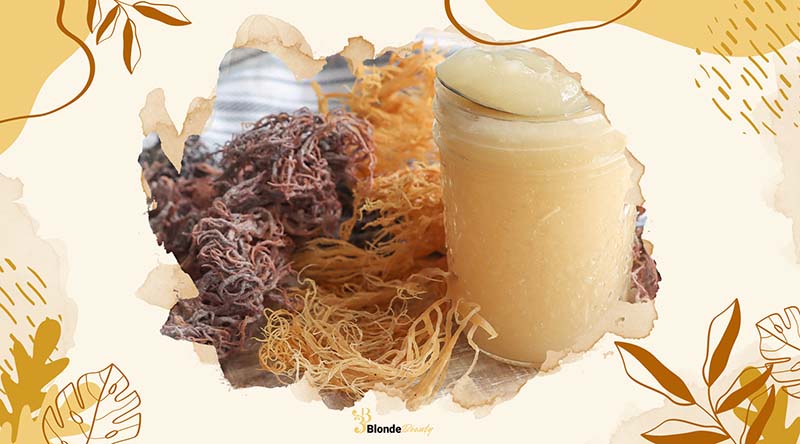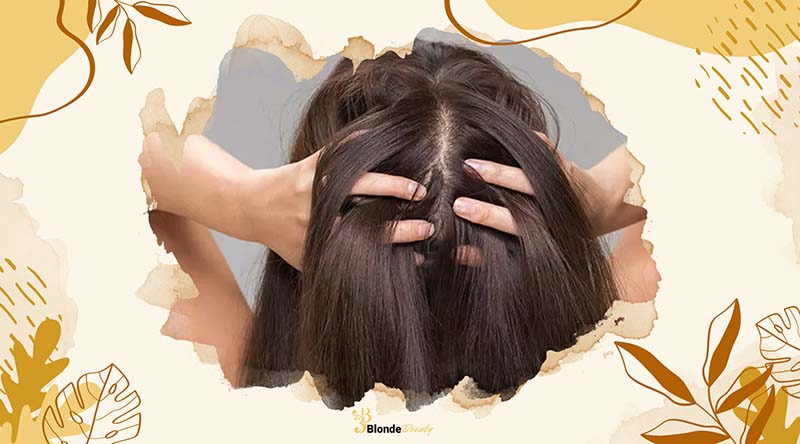Sea moss is quickly becoming celebrated as a superfood, making waves in both the nutritional and beauty sectors. Packed with an abundance of vitamins and minerals, this distinctive seaweed is praised for its capabilities as a weight loss supplement, an enhancer of immune function, and an anti-inflammatory resource. Moreover, the benefits of sea moss extend to improving hair health.
In this article, we will explore the specifics of sea moss and answer the question, “Is sea moss good for hair?” as we discover how it can help achieve healthier and more vibrant hair.
Is Sea Moss Good for Hair?
Numerous individuals report personal success stories of enhanced hair growth attributed to Sea Moss. While individual results can vary due to unique body chemistries, research does suggest that Sea Moss may promote hair follicle stimulation and foster hair growth.
Rich in hair-nourishing nutrients, Sea Moss is a powerhouse containing Omega-3 fatty acids, zinc, fucoidan, and folic acids. Its properties extend beyond basic nutrition; it is also antibacterial, antifungal, and antimicrobial.
Antioxidants within Sea Moss offer further benefits by protecting against UV damage, encouraging the regeneration of hair cells, and helping maintain essential hydration for healthy hair.

4 Main Uses of Sea Moss for Hair Growth
Sea moss offers numerous benefits for hair due to its rich nutrient profile. Here are four primary ways it can promote hair growth:
Moisturizing Your Hair
A key ingredient in Sea Moss is carrageenan, a gelatinous substance composed of sugar molecules that are entirely edible. Carrageenan is unique because it has a strong affinity for binding to water, making it an excellent addition to natural hair styling products.
When applied, carrageenan attracts water molecules and forms a protective film around each hair strand. This coating helps seal the hair cuticle, enhancing the hair’s strength and resilience.
An added advantage of using carrageenan-based products is that this protective film easily dissolves during shampooing. This ensures there are no lingering residues or buildup, which can be a common issue with other hair product ingredients like certain silicones.
Encouraging Natural Hair Growth
Sea moss is rich in beneficial nutrients, including fatty acids and folic acid. Folic acid, a vital mineral, plays a crucial role in the growth and health of skin and hair.
When applied to hair, folic acid can naturally accelerate the hair growth process by nourishing the scalp and follicles, promoting the development of new hair cells.

Enhancing Overall Scalp Health
Packed with antioxidants, sea moss supports overall scalp health. Antioxidants protect the skin, aid cell growth and metabolism, and power collagen synthesis.
Additionally, sea moss can help treat skin conditions such as eczema, psoriasis, and dandruff, contributing to a healthier scalp environment.
Protecting Against UV Damage
Sea moss is rich in fucoidan, an antioxidant that helps protect hair and skin from UV radiation.
Fucoidan reduces inflammation and eliminates free radicals, preventing damage caused by sun exposure.

What Vitamins Does Sea Moss Contain?
Sea moss has recently gained popularity as a supplement for enhancing overall health and well-being. This nutrient-rich plant is packed with antioxidants and essential vitamins, including A, C, E, K, and B.
Additionally, it boasts 92 minerals such as iron, zinc, magnesium, and potassium. Given its impressive nutrient profile, it’s no surprise that new benefits of sea moss for hair continue to be discovered.
Using Sea Moss for Hair Care
You can incorporate sea moss into your hair care routine in several ways, depending on your preference. It can be consumed orally in gel form, used to make DIY hair masks, or found in shampoos and conditioners containing sea moss.
For those who prefer a natural, do-it-yourself approach, here’s a simple method to create a nutrient-rich sea moss hair mask at home:
- Prepare the Sea Moss Gel: Take dry sea moss and boil it until it forms a gel-like consistency, or use a jar of premade sea moss gel.
2. Mix the Ingredients:
- Scoop two to three tablespoons of sea moss gel (depending on your hair length) into a bowl.
- Add a few drops of your favorite hair oil (such as olive oil, almond oil, or avocado oil) and mix until smooth.
3. Apply the Mask:
- Apply the mixture to your hair, starting from the scalp and working your way to the ends.
- Leave it on for 20 to 30 minutes, then rinse off with a mild shampoo.
You can store any remaining mixture in an airtight jar for future use. For best results, use the mask a few times a week.

Potential Side Effects of Sea Moss
Sea moss is a natural compound and generally safe to use. However, overuse can lead to potential side effects. Here are some to be aware of:
- High Iodine Content: Sea moss contains a high amount of iodine, which can cause hypothyroidism if consumed in excess.
- Allergic Reactions: It may trigger allergies in individuals with sensitive skin or seafood allergies.
- Digestive Issues: Overconsumption can lead to stomach issues such as nausea or diarrhea.
How Frequently Should You Apply Sea Moss to Your Hair?
Sea moss gel is well-tolerated by most hair types due to its nourishing yet non-greasy properties. It is advisable to use sea moss in your hair care routine 2-3 times a week for optimal results.
Starting with a sea moss hair mask once weekly is ideal. Depending on your hair’s response, you can gradually increase the usage frequency to establish a routine that best suits your specific hair needs.
Can Consuming Sea Moss Promote Hair Growth?
Consuming sea moss, whether in gel or raw form, can also significantly enhance hair growth. When ingested, the body absorbs the rich nutrients from sea moss and distributes them to areas that most need support, including the hair follicles.
The health and appearance of our hair are profoundly influenced by our diet. Integrating sea moss into a balanced diet can not only improve the condition and growth rate of your hair but also benefit your skin and overall health.
Conclusion
Sea moss is gaining popularity in skin and hair care products, and for good reason. Known for its soothing properties, Irish sea moss can alleviate scalp irritation, provide essential nourishment, strengthen strands, reduce hair fall, and boost shine.
While it is also believed to promote hair growth, further research is needed to fully validate this benefit. If you’re wondering, “Is sea moss good for hair?” the answer is yes. Try incorporating sea moss into your hair care routine to achieve soft, smooth hair.
Don’t forget to check out more blogs from Blonde Beauty for additional tips and insights on achieving your best hair ever.

Laureate Professor Clare Collins
Professor Clare Collins is a leading expert in nutrition and dietetics at the School of Health Sciences, part of the College of Health, Medicine and Wellbeing. Her work is changing the way we think about food and health. She grew up as one of nine children and was the first in her family to finish high school and go to college. This background gave her a strong work ethic and a deep appreciation for seizing opportunities.
As the Director of the Hunter Medical Research Institute’s Food and Nutrition Program and a recipient of three NHMRC Research Fellowships, Professor Collins is making a big difference in public health. She focuses on helping people who are often overlooked, using new technologies like apps and online programs to improve their nutrition and reduce the risk of chronic diseases.
Professor Collins is well-respected and has been recognized as a Fellow in four major health and science organizations. She leads a diverse team of experts, including dietitians, computer scientists, and engineers, working together on global health projects.
Her achievements are impressive. She has received over $29 million in research funding, published more than 450 papers, and helped 35 PhD and Master’s students complete their degrees. She’s also active in sharing her knowledge with the public. She has developed tools like the Australian Eating Survey and the Healthy Eating Quiz, and she often appears in the media to talk about nutrition.
PUBLISHED ARTICLES
- Collins, C. (2019). “The Effect of a Pilot Dietary Intervention on Pain Outcomes in Patients Attending a Tertiary Pain Service.”
- Collins, C. (2022). “Variation in cardiovascular disease risk factors among older adults.”
- Collins, C. (2022). “Evaluation of an online intervention for improving stroke survivors’ health-related quality of life: A randomised controlled trial.”
These articles show Professor Collins’s commitment to understanding how better nutrition can improve health. Her work is important for researchers, doctors, and anyone interested in healthy living.
